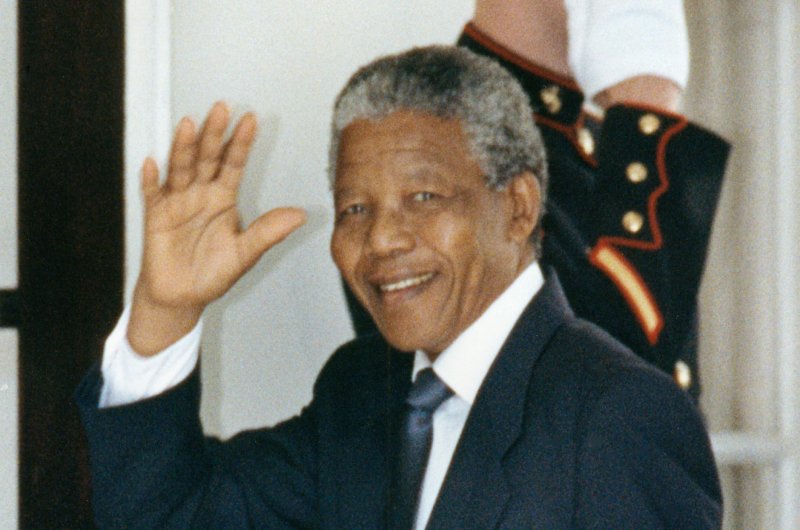1 of 6 | South African leader Nelson Mandela waves to the media upon arriving at the White House for his meeting with President Bush June 25, 1990. (UPI PHOTO/Matt Mendelsohn/FILES) |
License Photo
JOHANNESBURG, South Africa, Dec. 5 (UPI) -- Nelson Mandela, jailed for plotting a revolution and later elected South Africa's first black president, died Thursday at age 95, President Jacob Zuma said.
U.S. President Barack Obama said Mandela "achieved more than could be expected of any man."
Obama recalled the words Mandela spoke in the dock at his 1964 trial: "I have fought against white domination, and I have fought against black domination. I have cherished the ideal of a democratic and free society in which all persons live together in harmony and with equal opportunities. It is an ideal which I hope to live for and to achieve. But if needs be, it is an ideal for which I am prepared to die."
Obama called Mandela "one of the most influential, courageous, and profoundly good human beings that any of us will share time with on this Earth. He no longer belongs to us -- he belongs to the ages."
Former President George W. Bush, in a statement, said Mandela "was one of the great forces for freedom and equality of our time. He bore his burdens with dignity and grace, and our world is better off because of his example. This good man will be missed, but his contributions will live on forever."
Former President Bill Clinton said in a statement Mandela was one of history's "most important leaders and one of its finest human beings."
"History will remember Nelson Mandela as a champion for human dignity and freedom, for peace and reconciliation," Clinton said. "We will remember him as a man of uncommon grace and compassion, for whom abandoning bitterness and embracing adversaries was not just a political strategy but a way of life."
Mandela, who had been critically ill for long periods of time in recent years, "brought us together and it is together that we bid him farewell," Zuma said in announcing Mandela's death.
"Our nation has lost its greatest son," Zuma said in a televised address as he praised Mandela for "a life spent in service of the people of this country and in the cause of humanity."
"We saw in him what we seek in ourselves, and in him we saw so much of ourselves."
Zuma ordered the nation's flags to be flown at half-staff beginning Friday and to remain that way until after Mandela's funeral.
In announcing Mandela's death, Zuma referred to him by the nickname South Africans affectionately used -- Mandiba, or "father."
Zuma called on South Africans to "recall the values for which Mandiba fought. Let us reaffirm his vision of a society in which none is exploited, oppressed or dispossess by another."
Nelson Rolihlahla Mandela was imprisoned for 28 years for plotting to overthrow South Africa's apartheid government. He was released in 1990 as the country abandoned official racial segregation and was elected president in 1994.
Mandela brought the African National Congress to first-ever talks with South Africa's white minority government and gave the once-outlawed guerrilla-backed movement status of a parliamentary opposition.
Mandela shared the 1993 Nobel Peace Prize with reform-minded South African President Frederik de Klerk.
Mandela's early work as an opposition leader was interrupted when he was arrested in 1962 and accused of inciting workers to strike, and of leaving the country without valid travel permits. At his trial, Mandela argued the state had no jurisdiction over his activities since its laws were made by a government in which he was not represented.
"There comes a time," he told the court at the trial's conclusion, "as it came in my life, when a man is denied the right to live a normal life, when he can only live the life of an outlaw because the government has so decreed to use the law to impose a state of outlawry upon him."
He was initially sentenced to five years in prison, but he and eight other underground leaders were subsequently convicted of treason and sentenced to life in prison.
Upon his unconditional release by de Klerk in 1990, Mandela returned to activism, telling supporters, "We did not come this far to fail now."















